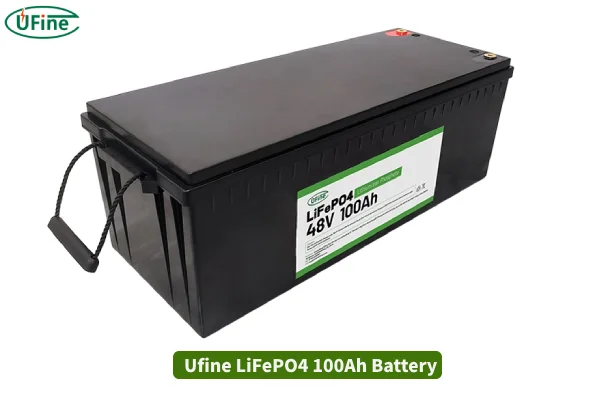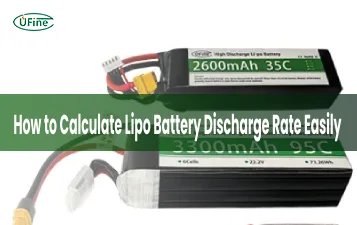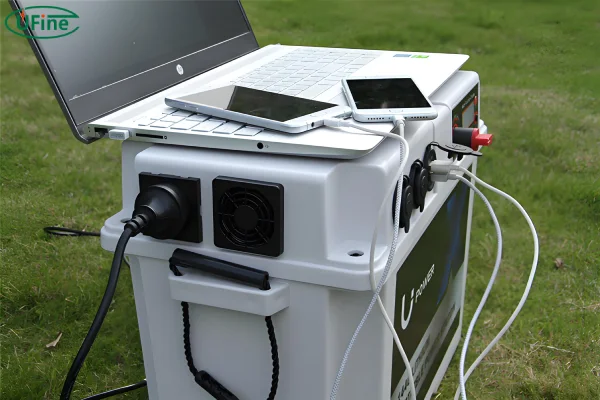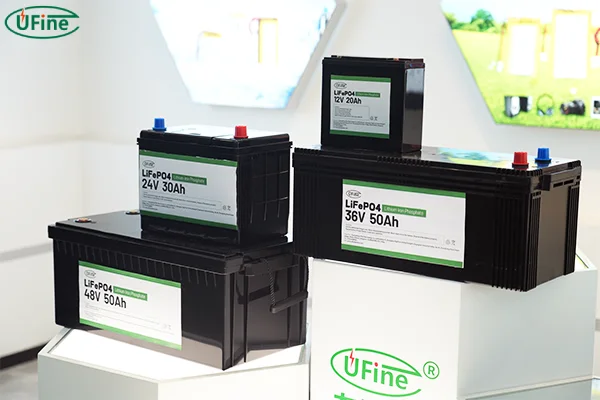In the ever-evolving landscape of energy storage, LiFePO4 100Ah batteries stand out as a reliable and efficient solution. Known for their stability and long lifespan, these batteries are increasingly sought after for various applications. In this comprehensive guide, we will explore what makes LiFePO4 100Ah batteries unique, delve into their common voltages, and discuss their numerous applications. Additionally, we’ll examine the advantages and disadvantages, highlight popular brands, and provide insights on pricing, selection, charging, and maintenance.
Part 1. What is LiFePO4 battery 100Ah?

A LiFePO4 100Ah battery, or lithium iron phosphate battery, offers a capacity of 100 ampere-hours. This means it can deliver a steady current of 100 amps for one hour, making it a powerhouse in energy storage. LiFePO4 chemistry is renowned for its thermal stability and safety, which significantly reduces the risk of overheating or combustion. These characteristics make LiFePO4 batteries an ideal choice for a wide range of demanding applications.
Part 2. Common voltages
Understanding the voltage options for LiFePO4 100Ah batteries is crucial for selecting the right one for your needs. These batteries are available in several standard voltages:
- 12V: Widely used in recreational vehicles (RVs) and smaller solar setups, the 12V configuration is perfect for low to medium power needs.
- 24V: Suitable for larger solar systems and certain types of electric vehicles, offering a balance between power and efficiency.
- 48V: Commonly used in home energy storage systems and more substantial electric vehicle setups, providing robust power output for extensive use.
Part 3. Applications
The versatility of LiFePO4 100Ah batteries enables their use across numerous sectors. Here are the most common applications:
- Solar Energy Systems: LiFePO4 batteries store solar energy efficiently, providing reliable power even when the sun isn’t shining. Their long lifespan and deep cycle capabilities make them perfect for both residential and commercial solar installations.
- Electric Vehicles (EVs): In EVs, these batteries offer consistent performance and extended range, making them a favorite among manufacturers and consumers.
- RVs and Campers: For those on the road, LiFePO4 batteries power appliances and electronics with ease, offering a dependable source of energy for extended trips.
- Marine Equipment: On boats and yachts, these batteries provide stable power, crucial for navigation and onboard systems.
- Backup Power Systems: In scenarios where power reliability is critical, such as data centers or medical facilities, LiFePO4 batteries ensure uninterrupted energy supply.
Part 4. Advantages and disadvantages
Advantages
LiFePO4 100Ah batteries come with numerous benefits:
- Long Lifespan: Capable of over 2000 charge cycles, they significantly outlast traditional lead-acid batteries.
- Safety: Their inherent stability reduces risks associated with overheating and combustion.
- Consistent Power Output: They maintain stable voltage, ensuring devices operate efficiently.
- Lightweight Design: Easier to handle and install compared to heavier alternatives.
- Eco-friendly: Free from toxic heavy metals, they pose less environmental risk.
These advantages highlight why LiFePO4 batteries are preferred in applications demanding high reliability and safety.
Disadvantages
Despite their benefits, LiFePO4 100Ah batteries have some limitations:
- Higher Initial Cost: They are more expensive upfront compared to other battery types, though their longevity often justifies the investment.
- Specific Charging Requirements: They require chargers designed specifically for LiFePO4 chemistry to maximize efficiency and lifespan.
- Performance in Cold Weather: Their efficiency can drop in extremely low temperatures, necessitating insulation or temperature control systems.
Understanding these disadvantages helps in making informed decisions and mitigating potential challenges.
Part 5. Popular brands and manufacturers
Several brands are leading the way in producing high-quality LiFePO4 100Ah batteries:
- Ufine Battery: A well-known Chinese manufacturer, Ufine specializes in lithium battery customization, offering a range of sizes, weights, capacities, and voltages tailored to client needs.
- Battle Born Batteries: Renowned for their durable and reliable batteries, Battle Born is a top choice for RV and marine applications.
- Renogy: A trusted name in solar energy, Renogy provides efficient and dependable battery solutions for solar systems.
- AIMS Power: Offers a wide range of power solutions, known for their robust performance and reliability.
- Bioenno Power: Specializes in lightweight and portable battery solutions, ideal for various applications.
Part 6. Price
10 Popular LiFePo4 Battery Price Comparison The cost of LiFePO4 100Ah batteries can vary based on brand, features, and market conditions. Typically, prices range from $800 to $1,200. Factors influencing price include build quality, warranty, and additional features such as built-in battery management systems (BMS). Although the initial investment is higher than some alternatives, the long-term benefits and savings from reduced replacements make them a cost-effective choice.
Part 7. How to choose the right LiFePO4 100Ah battery?
Selecting the right LiFePO4 100Ah battery involves several considerations:
- Application Requirements: Determine your power needs and ensure the battery meets or exceeds them.
- Voltage Compatibility: Ensure the battery voltage aligns with your system’s requirements.
- Budget: Consider the balance between cost and features, factoring in long-term savings.
- Brand Reputation: Opt for established manufacturers known for quality and service.
- Warranty and Support: Look for extended warranties and reliable customer support for peace of mind.
Part 8. Charging and maintenance
Proper charging and maintenance are vital for maximizing the lifespan and performance of LiFePO4 100Ah batteries:
- Use Appropriate Chargers: Ensure chargers are designed for LiFePO4 chemistry to prevent damage and enhance efficiency.
- Avoid Deep Discharges: Keeping the battery above 20% charge prevents unnecessary stress and prolongs life.
- Regular Inspections: Periodically check for physical damage and ensure connections are secure.
Part 9. How long does a 100Ah LiFePO4 battery last?
A 100Ah LiFePO4 battery can last over 10 years, depending on usage and maintenance. With more than 2000 charge cycles at 80% capacity, these batteries offer longevity unmatched by many alternatives. Proper care, including avoiding extreme temperatures and using suitable chargers, further extends their lifespan.
Part 10. How to choose a LiFePO4 battery 100Ah charger?
Selecting the right charger for your LiFePO4 100Ah battery is crucial:
- Ensure Voltage Compatibility: The charger must match the battery’s voltage to avoid damage.
- Look for Smart Features: Features like temperature regulation and automatic shutoff enhance safety and efficiency.
- Check Certifications: Ensure the charger meets safety and efficiency standards for peace of mind.
Choosing the right charger not only protects your investment but also ensures optimal battery performance and longevity.
In conclusion, LiFePO4 100Ah batteries offer a powerful, safe, and reliable energy solution for diverse applications. By understanding their features, applications, and maintenance needs, you can make informed decisions and harness their full potential for your energy requirements.
Related Tags:
More Articles

LiPo Battery Discharge Rate Guide & Calculation Tips
Understand LiPo battery discharge rates, C-ratings, and how to calculate max current. Essential guide for RC, drones, and electronics users.
High‑Capacity 3S LiPo Batteries: 5000 mAh vs. 10000 mAh
Compare 3S LiPo 5000mAh vs 10000mAh batteries by weight, power, and use. Find the best fit for your drone, RC car, or boat setup.
Top 5 Applications for Small 3S LiPo Batteries
Small 3S LiPo batteries power drones, RC gear, wearables, and robotics with high energy and low weight. Making them ideal for compact electronics projects.
Building and Charging Your Own 3S LiPo Pack: A Step‑by‑Step Guide
Learn how to build, balance, and charge a 3S LiPo battery pack safely at home with this complete DIY guide for hobbyists and beginners.
How to Choose the Right LiPo Battery Plug Type?
Discover the best LiPo battery plug types, how to choose them, and expert tips for safe usage, soldering, and maintenance.





